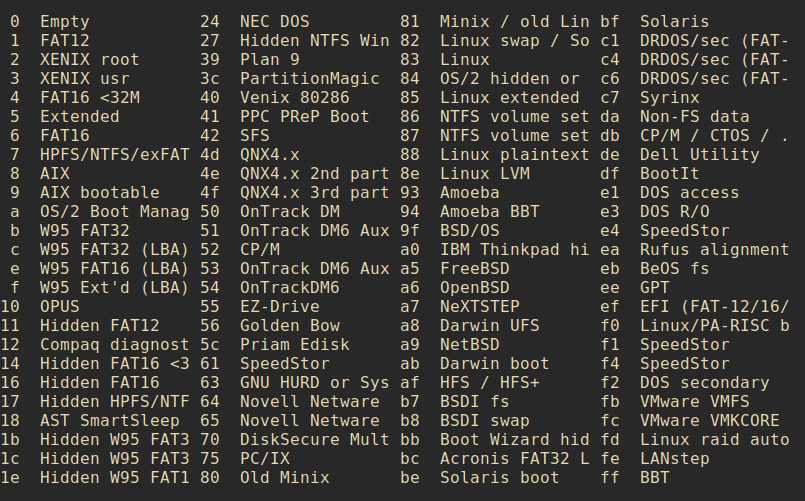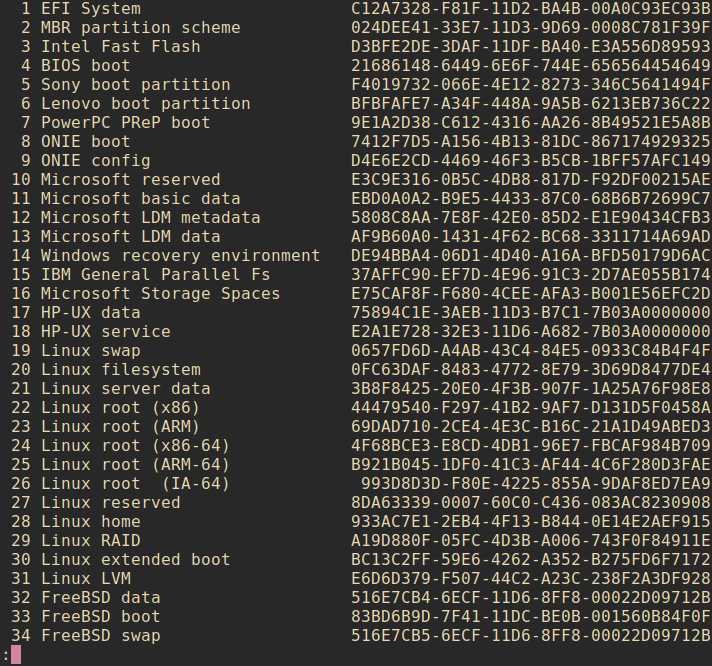标签:轻松 hex 容量 parted 布局 ola 系统 ref boot
fdisk是Linux系统中最常用的分区工具,通过这个命令也可以查看系统中所有可用的分区,但是这个命令只支持MBR的分区表(这句话应该只对某些系统,CentOS7-1810适用,Debian9.5和openSUSE15应该已经支持GPT分区表,下面对fdisk的操作都是在Debian9.5下操作),所以这个命令不能对大于2T的硬盘进行分区,大于2T的硬盘我们需要用GPT分区表来进行分区,GPT分区我们就要用gdisk或parted分区工具来进行分区。
Linux 内核是如何理解硬盘的?
作为人类,我们可以很轻松地理解一些事情;但是电脑就不是这样了,它们需要合适的命名才能理解这些。
在 Linux 中,外围设备都位于 /dev 挂载点,内核通过以下的方式理解硬盘:
/dev/hdX[a-z]: IDE 硬盘被命名为 hdX
/dev/sdX[a-z]: SCSI 硬盘被命名为 sdX
/dev/xdX[a-z]: XT 硬盘被命名为 xdX
/dev/vdX[a-z]: 虚拟硬盘被命名为 vdX
/dev/fdN: 软盘被命名为 fdN
/dev/scdN or /dev/srN: CD-ROM 被命名为 /dev/scdN 或 /dev/srN
fdisk 允许我们在每块硬盘上创建最多四个主分区。它们中的其中一个可以作为扩展分区,并下设多个逻辑分区。1-4 扇区作为主分区被保留,逻辑分区从扇区 5 开始。
一、fdisk参数使用方法:
fdisk [-l] 设备名
参数
-l :显示指定磁盘设备的分区表信息,如果没有指定磁盘设备,则显示/proc/partitions 文件中的信息,也就是系统中所有的磁盘设备。
举例:
-----------------------------------------------------------
root@debian:~# fdisk -l #没有指定任何磁盘设备
Disk /dev/sda: 20 GiB, 21474836480 bytes, 41943040 sectors #第一块磁盘/dev/sda容量20G
Units: sectors of 1 * 512 = 512 bytes
Sector size (logical/physical): 512 bytes / 512 bytes
I/O size (minimum/optimal): 512 bytes / 512 bytes
Disklabel type: dos #分区表的类型为MBR (dos表示MBR分区表,gpt表示GPT分区表)
Disk identifier: 0xefdc905c
Device Boot Start End Sectors Size Id Type #磁盘/dev/sda下的分区
/dev/sda1 * 2048 37748735 377466881 8G 83 Linux
/dev/sda2 37750782 41940991 4190210 2G 5 Extended
/dev/sda5 37750784 41940991 4190208 2G 82 Linux swap / Solaris
Disk /dev/sdb: 5 GiB, 5368709120 bytes, 10485760 sectors #第二块磁盘/dev/sdb容量5G
Units: sectors of 1 * 512 = 512 bytes
Sector size (logical/physical): 512 bytes / 512 bytes
I/O size (minimum/optimal): 512 bytes / 512 bytes
root@debian:~#
-----------------------------------------------------------
使用 "fdisk -l" 查看分区信息,不同的发行版可能显示的信息不同,通过上面的信息能够看到我们添加的两块硬盘(/dev/sda 和 /dev/sdb)的信息。我们解释一下这些信息,其上半部分是硬盘的整体状态,/dev/sda 硬盘的总大小是20GB等信息。
信息的下半部分是分区的信息,共 7 列,含义如下:
Device:分区的设备文件名。
Boot:是否为启动引导分区,在这里 /dev/sda1 为启动引导分区。
Start:起始柱面,代表分区从哪里开始。
End:终止柱面,代表分区到哪里结束。
Sectors:分区的大小,单位是扇区。
Size:分区的容量
id:分区内文件系统的 ID。
Type:分区的文件系统是什么。
二、fdisk交互模式磁盘分区
通过命令“fdisk 设备文件名” 就可以进入fdisk程序的交互模式,在交互模式中可以通过输入fdisk程序所提供的指令完成相应的操作,举例如下
-----------------------------------------------------------
root@debian:~# fdisk /dev/sdb
Welcome to fdisk (util-linux 2.29.2).
Changes will remain in memory only, until you decide to write them.
Be careful before using the write command.
Device does not contain a recognized partition table.
Created a new DOS disklabel with disk identifier 0xe3779e93.
Command (m for help): m #输入m可以获得帮助信息
Help:
DOS (MBR)
a toggle a bootable flag #设置可引导标记
b edit nested BSD disklabel #编辑 bsd 磁盘标签
c toggle the dos compatibility flag #设置 DOS 操作系统兼容标记
G eneric
d delete a partition #删除一个分区
F list free unpartitioned space #列出空闲的未分区空间
l list known partition types #显示已知的分区类型。82 为 Linux swap 分区,83 为 Linux 分区
n add a new partition # 新建分区
p print the partition table #显示当前磁盘的分区列表
t change a partition type #改变分区类型
v verify the partition table #验证分区表
i print information about a partition #打印有关分区的信息
Misc
m print this menu #显示帮助菜单
u change display/entry units #改变显示记录单位
x extra functionality (experts only) #附加功能(仅专家)
Script
I load disk layout from sfdisk script file #从sfdisk脚本文件加载磁盘布局
O dump disk layout to sfdisk script file #将磁盘布局转储到sfdisk脚本文件
Save & Exit
w write table to disk and exit #保存退出
q quit without saving changes #不保存退出
Create a new label
g create a new empty GPT partition table #新建空白GPT分区表,这个应该就表明fdisk已经支持GPT,还需要进一步的认证。
G create a new empty SGI (IRIX) partition table #新建空白IRIX分区表
o create a new empty DOS partition table #新建空白DOS分区表
s create a new empty Sun partition table #新建空白SUN磁盘标签
Command (m for help):
-----------------------------------------------------------
三、分区管理
1、新建主分区
root@debian:~# fdisk /dev/sdb #要新建分区的磁盘/dev/sdb不要加数字加数字就变成了分区
Welcome to fdisk (util-linux 2.29.2).
Changes will remain in memory only, until you decide to write them.
Be careful before using the write command.
Device does not contain a recognized partition table.
Created a new DOS disklabel with disk identifier 0xd9b1702f.
Command (m for help): n #输入n新建分区,默认直接创建MBR分区表
Partition type
p primary (0 primary, 0 extended, 4 free) #主分区
e extended (container for logical partitions) #扩展分区
Select (default p): p #输入p新建主分区
Partition number (1-4, default 1): #输入分区号,直接回车就行,默认为1
First sector (2048-10485759, default 2048): #输入起始扇区,直接回车就行,默认2048最前面开始
Last sector, +sectors or +size{K,M,G,T,P} (2048-10485759, default 10485759): +1G #这里输入新增分区的大小可以通过扇区数来增加,也可以通过+size{K,M,G,T,P}方式来增加,这里要增加1G的容量就表示为+1G
Created a new partition 1 of type ‘Linux‘ and of size 1 GiB. #提示创建了1G的分区
Command (m for help): p #输入p查看创建的分区
Disk /dev/sdb: 5 GiB, 5368709120 bytes, 10485760 sectors
Units: sectors of 1 * 512 = 512 bytes
Sector size (logical/physical): 512 bytes / 512 bytes
I/O size (minimum/optimal): 512 bytes / 512 bytes
Disklabel type: dos #分区表类型为MBR
Disk identifier: 0xd9b1702f
Device Boot Start End Sectors Size Id Type
/dev/sdb1 2048 2099199 2097152 1G 83 Linux
2、剩余可用的空间
Command (m for help): F #输入F查看剩余可用的空间
Unpartitioned space /dev/sdb: 4 GiB, 4293918720 bytes, 8386560 sectors
Units: sectors of 1 * 512 = 512 bytes
Sector size (logical/physical): 512 bytes / 512 bytes
Start End Sectors Size
2099200 10485759 8386560 4G #可以看到可用空间为4G
3、创建扩展分区及逻辑分区
Command (m for help): n #输入n继续创建分区
Partition type
p primary (1 primary, 0 extended, 3 free)
e extended (container for logical partitions)
Select (default p): e #输入e创建扩展分区
Partition number (2-4, default 2): #输入扩展分区号,直接回车就可以
First sector (2099200-10485759, default 2099200): #输入起始扇区数,直接回车就可以
Last sector, +sectors or +size{K,M,G,T,P} (2099200-10485759, default 10485759): +2G #增加2G的容量
Created a new partition 2 of type ‘Extended‘ and of size 2 GiB. #创建扩展分区成功
Command (m for help): n #输入n继续创建分区
Partition type
p primary (1 primary, 1 extended, 2 free)
l logical (numbered from 5) #只有创建了扩展分区才会有这个选项
Select (default p): l #输入l创建逻辑分区
Adding logical partition 5 #扩展分区号从5开始
First sector (2101248-6293503, default 2101248):
Last sector, +sectors or +size{K,M,G,T,P} (2101248-6293503, default 6293503): +1G
Created a new partition 5 of type ‘Linux‘ and of size 1 GiB.
Command (m for help): p
Disk /dev/sdb: 5 GiB, 5368709120 bytes, 10485760 sectors
Units: sectors of 1 * 512 = 512 bytes
Sector size (logical/physical): 512 bytes / 512 bytes
I/O size (minimum/optimal): 512 bytes / 512 bytes
Disklabel type: dos
Disk identifier: 0xd9b1702f
Device Boot Start End Sectors Size Id Type
/dev/sdb1 2048 2099199 2097152 1G 83 Linux #主分区
/dev/sdb2 2099200 6293503 4194304 2G 5 Extended #扩展分区
/dev/sdb5 2101248 4198399 2097152 1G 83 Linux #逻辑分区
4、删除分区
Command (m for help): d #删除分区
Partition number (1,2,5, default 5): 2 #删除扩增分区2,上面的逻辑分区也会一同删除
Partition 2 has been deleted.
Command (m for help): p
Disk /dev/sdb: 5 GiB, 5368709120 bytes, 10485760 sectors
Units: sectors of 1 * 512 = 512 bytes
Sector size (logical/physical): 512 bytes / 512 bytes
I/O size (minimum/optimal): 512 bytes / 512 bytes
Disklabel type: dos
Disk identifier: 0xd9b1702f
Device Boot Start End Sectors Size Id Type
/dev/sdb1 2048 2099199 2097152 1G 83 Linux
Command (m for help):
5、修改分区类型
Command (m for help): l #查看可用分区类型

#其中82为Linux swap分区、83为Linux分区、8e为LinuxLVM分区、b为Windows FAT32分区、e为Windows FAT16分区。
Command (m for help): t #输入n更改分区类型
Partition number (1,2,5, default 5): 5 #更改分区5的类型
Partition type (type L to list all types): 8e #输入更改分区类型为8e,这里输入l也可以查看分区的类型
Changed type of partition ‘Linux‘ to ‘Linux LVM‘. #提示更改成功
Command (m for help): p
Disk /dev/sdb: 5 GiB, 5368709120 bytes, 10485760 sectors
Units: sectors of 1 * 512 = 512 bytes
Sector size (logical/physical): 512 bytes / 512 bytes
I/O size (minimum/optimal): 512 bytes / 512 bytes
Disklabel type: dos
Disk identifier: 0xd9b1702f
Device Boot Start End Sectors Size Id Type
/dev/sdb1 2048 2099199 2097152 1G 83 Linux
/dev/sdb2 2099200 6293503 4194304 2G 5 Extended
/dev/sdb5 2101248 4198399 2097152 1G 8e Linux LVM #更改后的分区类型
Command (m for help):
6、保存修改的结果
Command (m for help): w #输入w保存配置,如果不想保存可以输入q退出
The partition table has been altered.
Calling ioctl() to re-read partition table.
Syncing disks.
使用w指令保存后,则在fdisk中所做的所有操作都会生效,且不可回退。如果分区表正忙,则需要重启机器后才能使新的分区表生效。
四、新建GPT分区
不是所有的发行版带的fdisk都支持GPT分区这里请注意
1、新建分区
Command (m for help): p
Disk /dev/sdb: 5 GiB, 5368709120 bytes, 10485760 sectors
Units: sectors of 1 * 512 = 512 bytes
Sector size (logical/physical): 512 bytes / 512 bytes
I/O size (minimum/optimal): 512 bytes / 512 bytes
Disklabel type: dos #现在的分区类型为MBR
Disk identifier: 0xd9b1702f
Command (m for help): g #输入g创建GPT分区
Created a new GPT disklabel (GUID: 8C0F4613-2830-40E1-8D23-596D1B7F5DDB).
Command (m for help): n #新建分区
Partition number (1-128, default 1): #可以看到这里没有扩展分区的概念了
First sector (2048-10485726, default 2048):
Last sector, +sectors or +size{K,M,G,T,P} (2048-10485726, default 10485726): +1G
Created a new partition 1 of type ‘Linux filesystem‘ and of size 1 GiB.
Command (m for help): p
Disk /dev/sdb: 5 GiB, 5368709120 bytes, 10485760 sectors
Units: sectors of 1 * 512 = 512 bytes
Sector size (logical/physical): 512 bytes / 512 bytes
I/O size (minimum/optimal): 512 bytes / 512 bytes
Disklabel type: gpt
Disk identifier: 8C0F4613-2830-40E1-8D23-596D1B7F5DDB
Device Start End Sectors Size Type #GPT下输入p显示的分区信息和MBR下略有不同,没有分区类型id的选项
/dev/sdb1 2048 2099199 2097152 1G Linux filesystem #成功创建了一个主分区
Command (m for help):
2、 修改分区的类型
Command (m for help): l #查看分区的类型,GPT下同样的分区类型对应的编号不同了,这里要注意

上面只是显示了部分按空格显示更多的信息
Command (m for help): t #输入t更改分区类型,这里输入l也可以查看分区的类型
Partition number (1,2, default 2): 2 #输入要更改的分区
Hex code (type L to list all codes): 31 #输入分区类型的编号
Changed type of partition ‘Linux filesystem‘ to ‘Linux LVM‘. #更改分区类型成功
Command (m for help): p
Disk /dev/sdb: 5 GiB, 5368709120 bytes, 10485760 sectors
Units: sectors of 1 * 512 = 512 bytes
Sector size (logical/physical): 512 bytes / 512 bytes
I/O size (minimum/optimal): 512 bytes / 512 bytes
Disklabel type: gpt
Disk identifier: 836D334F-D0EE-4AD3-8581-EC9ABFF31F50
Device Start End Sectors Size Type
/dev/sdb1 2048 2099199 2097152 1G Linux filesystem
/dev/sdb2 2099200 4196351 2097152 1G Linux LVM #分区类型为已经更改
Command (m for help):
标签:轻松 hex 容量 parted 布局 ola 系统 ref boot
原文地址:https://www.cnblogs.com/pipci/p/11368327.html